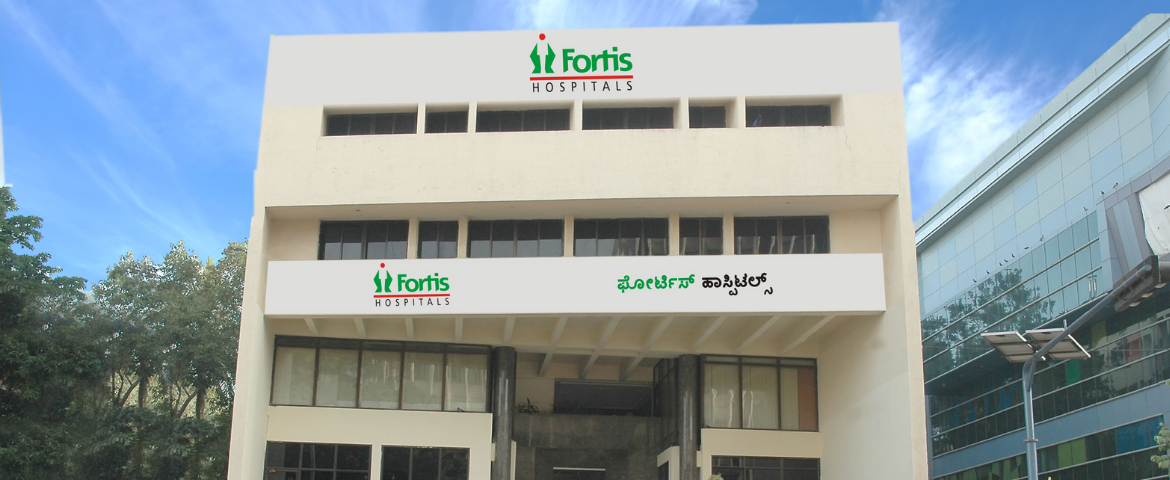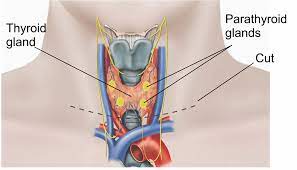Thyroidectomy cost in India
The cost of Thyroidectomy in India ranges
from USD 2000 to USD 5000
Procedure Description:
Thyroidectomy:
A thyroidectomy is a surgical procedure that removes all or part of the thyroid gland. Endocrine or head and neck surgeons frequently do thyroidectomy in general surgery when a patient has thyroid cancer, another thyroid gland ailment, or a goiter.
Disease Overview:
Thyroid Cancer:
Thyroid cancer develops in the cells of the thyroid, a butterfly-shaped gland found just below your Adam's apple at the base of your neck. Hormones made by your thyroid control your heart rate, blood pressure, body temperature, and weight. Thyroid cancer may not show any signs or symptoms at first. However, when it expands, it can cause neck pain and swelling.
Disease Signs and Symptoms:
Early on in the course of thyroid cancer, there are usually no indications or symptoms. Thyroid cancer can lead to the following symptoms as it progresses:
1- A lump (nodule) on your neck that may be felt through the skin
2- Changes in your voice, such as a hoarseness increase
3- Swallowing problems
4- Neck and throat discomfort
5- Neck lymph nodes that are swollen
Disease Causes:
The aetiology of thyroid cancer is unknown.
When cells in your thyroid undergo genetic alterations, thyroid cancer develops (mutations). The mutations allow the cells to reproduce and expand quickly. The cells also lose their capacity to perish in the same way that regular cells do. The abnormal thyroid cells clump together to form a tumour. The aberrant cells might infect neighbouring tissue and move to other regions of the body (metastasize).
Risk Factors
Thyroid cancer is linked to a number of factors, including:
- Women are more likely than males to have thyroid cancer.
- Radiation exposure at extreme levels. Thyroid cancer is increased by radiation therapy treatments to the head and neck.
Certain genetic disorders are inherited. Familial medullary thyroid cancer, multiple endocrine neoplasia, Cowden's disease, and familial adenomatous polyposis are all genetic disorders that raise the risk of thyroid cancer.
Disease Diagnosis:
Thyroid cancer is diagnosed using the following tests and procedures:
- Examination of the body. Your doctor will feel for physical changes in your thyroid, such as thyroid nodules, by examining your neck. He or she may also inquire about your risk factors, such as prior radiation exposure or a family history of thyroid cancer.
- Tests on the blood. Blood tests are used to see if the thyroid gland is working properly.
- Ultrasound imaging is a type of imaging that uses sound waves to create Ultrasound creates images of bodily structures by using high-frequency sound waves. The ultrasound transducer is put on your lower neck to generate a picture of your thyroid. The look of your thyroid on ultrasound aids your doctor in determining if a thyroid nodule is likely to be benign (noncancerous) or whether there's a chance it might be cancerous (malignant).
Taking a sample of thyroid tissue out of the body. A fine-needle aspiration biopsy involves your doctor inserting a long, thin needle into the thyroid nodule via your skin. Ultrasound imaging is commonly utilized to guide the needle into the nodule with precision. The needle is used by your doctor to extract samples of abnormal thyroid tissue. In the laboratory, the sample is examined for cancer cells.
Other types of imaging examinations One or more imaging tests may be performed to assist your doctor in determining if your cancer has progressed beyond the thyroid. CT, MRI, and nuclear imaging examinations using a radioactive version of iodine are examples of imaging tests.
Genetic testing is a method of determining a person' Genetic alterations in certain patients with medullary thyroid carcinoma have been linked to other endocrine tumours.
Disease Treatment:
Treatment choices for thyroid cancer are determined by the kind and stage of the tumour, as well as your overall health and preferences.
The majority of thyroid malignancies are treatable.
Thyroid cancers that are very tiny and have a minimal risk of spreading throughout the body may not require treatment immediately soon. Instead, consider active surveillance, which involves regular cancer monitoring. Once or twice a year, your doctor may prescribe blood tests and a neck ultrasound exam.
Some people's cancers may never progress and require no treatment. Others may ultimately be able to identify development and begin therapy.
Surgery:
Thyroid cancer is treated with the following procedures:
Thyroid surgery that involves the removal of whole or part of the thyroid gland (thyroidectomy). A total thyroidectomy (removal of all thyroid tissue) or a partial thyroidectomy (removal of most thyroid tissue) are two options for removing the thyroid gland (near-total thyroidectomy). To limit the danger of harm to the parathyroid glands, which help control calcium levels in your blood, the surgeon generally leaves tiny rims of thyroid tissue surrounding them.
Thyroid surgery involves removing a piece of the thyroid gland (thyroid lobectomy). The surgeon removes half of the thyroid during a thyroid lobectomy. If you have a slow-growing thyroid cancer in one section of the thyroid and no worrisome nodules in other parts of the thyroid, it may be advised.
Lymph nodes in the neck are removed (lymph node dissection). The surgeon may also remove neighbouring lymph nodes in your neck when removing your thyroid. These can be examined for cancer indicators.
Thyroid hormone replacement treatment
You can take the thyroid hormone drug levothyroxine (Levoxyl, Synthroid, and others) for the rest of your life if you have a thyroidectomy.
There are two advantages to using this medication: It replaces the hormone that your thyroid would typically produce and inhibits the pituitary gland's synthesis of thyroid-stimulating hormone (TSH). High TSH levels might potentially promote the growth of any residual cancer cells.
- Iodine that is radioactive
- Large dosages of a radioactive type of iodine are used in radioactive iodine therapy.
- After a thyroidectomy, radioactive iodine therapy is commonly used to eliminate any remaining healthy thyroid tissue as well as tiny patches of thyroid cancer that were not removed during surgery.
- Radiation treatment administered from the outside
- External radiation treatment is delivered by a machine that directs high-energy beams, such as X-rays and protons, at specific areas on your body (external beam radiation therapy). You lie motionless on a table while a machine travels around you during therapy.
If surgery isn't an option and your cancer continues to develop after radioactive iodine treatment, you may need external beam radiation therapy. If there's a chance your cancer will come back after surgery, radiation therapy may be advised.
- Chemotherapy: Chemotherapy is a medicinal treatment that kills cancer cells by using chemicals. Chemotherapy is usually administered as a venous infusion. The chemicals spread throughout your body, destroying fast-growing cells such as cancer cells.
Chemotherapy is seldom used to treat thyroid cancer, however it is occasionally indicated for persons with anaplastic thyroid cancer. Chemotherapy and radiation treatment can be used together.
- Drug treatment with a specific goal
- Targeted medication therapies are designed to target particular abnormalities seen in cancer cells. Targeted medication therapies can kill cancer cells by inhibiting these aberrations.
- Thyroid cancer medication therapy that targets the signals that instruct cancer cells to grow and divide is called targeted therapy. It's most commonly used to treat advanced thyroid cancer.
- Alcohol ablation is injecting alcohol into tiny thyroid malignancies while employing imaging such as ultrasound to guarantee accurate injection placement. Thyroid tumours diminish as a result of this surgery.
If your cancer is tiny and surgery isn't an option, alcohol ablation may be a possibility. It's also occasionally used to treat cancer that returns after surgery in the lymph nodes.
- Palliative (supportive) care
Palliative care is a type of medical treatment that focuses on relieving pain and other symptoms associated with a severe disease. Palliative care professionals collaborate with you, your family, and your other doctors to add an extra layer of support to your continuing treatment.
Country wise cost comparison for Thyroidectomy:
| Country | Cost |
|---|---|
| India | $2520 |
| United Arab Emirates | $6962 |
Treatment and Cost
7
Total Days
In Country
- 2 Day in Hospital
- 2 No. Travelers
- 5 Days Outside Hospital
Treatment cost starts from
$2800
Popular Hospital & Clinic
Featured Hospital
0 Hospitals
Related Packages
More Related Information
Some of the top rated hospitals are:
- Iran
- Hasheminejad Kidney Center (HKC) Tehran, Iran
- Kasra Hospital Tehran, Iran
- Bahman Hospital Tehran, Iran
- Atieh Hospital Tehran, Iran
- Erfan Hospital Tehran, Iran
- Nikan Hospital Tehran, Iran
- United Arab Emirates
- Burjeel Hospital, Abu Dhabi
- New Hope IVF Gynaecology & Fertility Hospital, Sharjah
- Iranian Hospital, Dubai
- Kings College Hospital Dubai
- Zulekha Hospital Sharjah
- Burjeel Hospital for Advanced Surgery Dubai
- Burjeel Medical City, Abu Dhabi
- NMC Royal Hospital, Khalifa City, Abu Dhabi
- NMC Royal Hospital Sharjah
- AL NOOR HOSPITAL, Abu Dhabi
- Al Zahra hospital, Dubai
- NMC Specialty Hospital, Al Nahda, Dubai
- Singapore
- Mount Elizabeth Hospital, Singapore
- National University Hospital, Singapore
- Singapore General Hospital, Singapore
- Changi General Hospital, Singapore
- Gleneagles Hospital, Singapore
- Johns Hopkins Singapore International Medical Centre, Singapore
- Thomson Medical Centre, Singapore
- Mount Alvernia Hospital, Singapore
- Novena Medical Centre, Singapore
- Alexandra Hospital, Singapore
- Saudi Arabia




